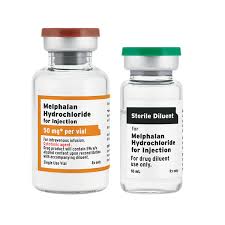When it comes to treating cancer in cats, melphalan has emerged as a valuable chemotherapy drug. Originally developed for human use, this alkylating agent is now being used off-label by veterinarians to treat various feline cancers. While it’s not FDA-approved for pets, its effectiveness in managing certain types of cancer makes it a go-to option for many veterinary oncologists.
At Pet World GDL , we aim to provide pet owners with clear, science-backed information about treatments like melphalan so they can make informed decisions alongside their veterinarian.
What Is Melphalan?
Melphalan is a chemotherapy drug classified as an alkylating agent . It works by interfering with the DNA and RNA synthesis of rapidly dividing cells — particularly cancerous ones. This mechanism helps slow or stop the growth of abnormal cells, making it effective against several types of cancer.
Originally developed during World War II as a treatment for tumors, melphalan remains on the World Health Organization’s (WHO) list of essential medicines due to its efficacy and versatility.
In veterinary medicine, melphalan is primarily used for blood-related cancers such as:
- Multiple myeloma
- Leukemia
- Lymphoma
- Osteosarcoma
- Resistant forms of leukemia
Despite its potency, melphalan must be handled and administered with care due to its cytotoxic nature.
How Is Melphalan Used in Cats?
Melphalan can be administered either orally (as tablets or compounded liquid) or intravenously (IV). The choice depends on the type of cancer, the cat’s overall health, and how the tumor responds to treatment.
Dosage Guidelines
The typical oral dosage for cats ranges around 0.1 mg/kg per day , although this may vary based on individual patient needs. Treatment plans are closely monitored by a vet, often involving regular blood tests every two weeks initially, then monthly, to ensure the cat is tolerating the medication well and not experiencing dangerous drops in blood cell counts.
For example:
- In cases of multiple myeloma , studies have shown that approximately 92% of affected cats respond positively to melphalan combined with prednisone.
- However, median survival time after starting melphalan therapy in cats is around 137 days , compared to dogs who may live up to 540 days on similar protocols.
This highlights the importance of species-specific treatment planning and monitoring.
Conditions Treated with Melphalan in Cats
While less common than in dogs, multiple myeloma and other plasma cell disorders do occur in cats. These include:
- Immunoglobulin G (IgG) myeloma – the most common type
- Immunoglobulin A (IgA) myeloma – less frequent
Melphalan is also used for resistant leukemias and relapsed lymphomas, where traditional therapies may no longer be effective.
Common Side Effects of Melphalan in Cats
Like all chemotherapy drugs, melphalan carries risks. Side effects stem from its impact on both cancerous and healthy, rapidly dividing cells — especially those in the bone marrow.
Most Common Side Effects:
- Bone marrow suppression : Leads to reduced red blood cells (anemia), white blood cells (neutropenia), and platelets (thrombocytopenia).
- Gastrointestinal upset : Includes vomiting, diarrhea, and loss of appetite.
- Increased risk of infection : Due to lowered white blood cell counts.
- Bladder irritation : May cause hematuria (blood in urine) or frequent urination.
Severe side effects requiring immediate veterinary attention include:
- Difficulty breathing
- Signs of allergic reaction
- Persistent vomiting or diarrhea lasting more than 48 hours
- Lethargy or weakness
Pregnant or nursing cats should never receive melphalan due to the risk of fetal harm.
Precautions and Contraindications
Before starting melphalan therapy, your veterinarian will consider several factors:
- Liver or kidney disease – melphalan should be avoided in cats with pre-existing organ dysfunction.
- Active infections – treatment should be postponed until infections are resolved.
- Recent vaccinations – immunosuppressive effects of melphalan can interfere with vaccine response.
- Drug interactions – inform your vet about any medications or supplements your cat is currently taking.
Cats undergoing melphalan treatment require regular bloodwork to monitor for myelosuppression and organ function.
Handling and Storage of Melphalan
Due to its hazardous nature, melphalan must be handled with extreme care:
- Always wear disposable gloves when handling the medication.
- Avoid crushing tablets unless specifically instructed by a vet.
- Store compounded formulations according to the pharmacy’s instructions.
- Commercially available products should be refrigerated at 36–46°F (2–8°C) in a tightly sealed container.
Proper disposal of unused medication and contaminated materials is essential to protect both humans and other pets.
Drug Interactions
Melphalan can interact with other medications, including:
- Cimetidine
- Digoxin
- Other chemotherapeutic agents or immunosuppressants
Always inform your vet about all medications your cat is taking to avoid potentially dangerous interactions.
Cost and Efficacy Considerations
The cost of melphalan varies depending on:
- Dose required
- Frequency of administration
- Whether the formulation is generic or brand-name (e.g., Alkeran vs. Alkacel)
Generic versions, such as Alkacel from India, are significantly cheaper — sometimes costing less than 25% of the brand-name version.
While melphalan can offer meaningful remission in some cases, its high cost and potential toxicity mean that alternatives like cyclophosphamide and prednisolone or chlorambucil-based regimens may be considered first, especially for long-term management.
Comparison with Other Feline Chemotherapy Drugs
Your vet will help determine which drug offers the best balance between efficacy, safety, and quality of life for your cat.
Final Thoughts
Melphalan is a powerful tool in the fight against certain cancers in cats. When used carefully and under strict veterinary supervision, it can offer significant benefits — even in difficult-to-treat cases.
However, due to its strong side effect profile and handling precautions, it’s not a decision to be made lightly. Pet owners must work closely with a qualified veterinary oncologist to ensure the safest and most effective treatment plan.
If you’re considering melphalan for your cat, visit Pet World GDL for more expert insights and resources on feline cancer care.



